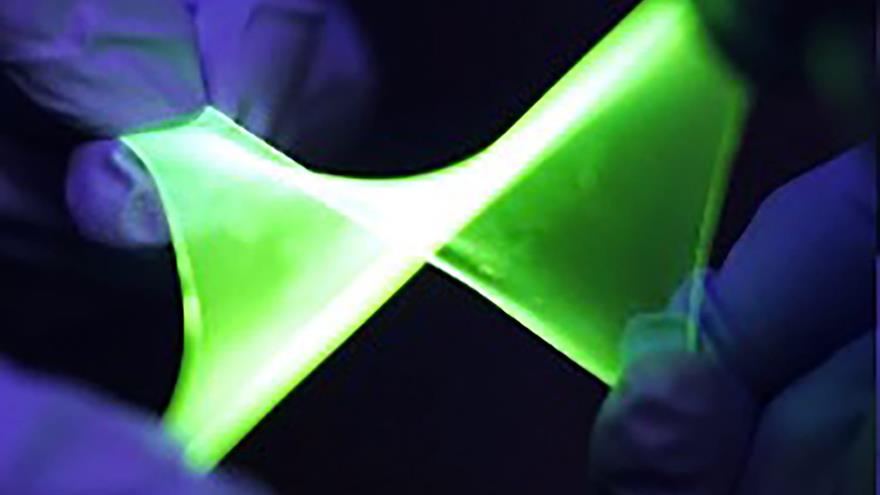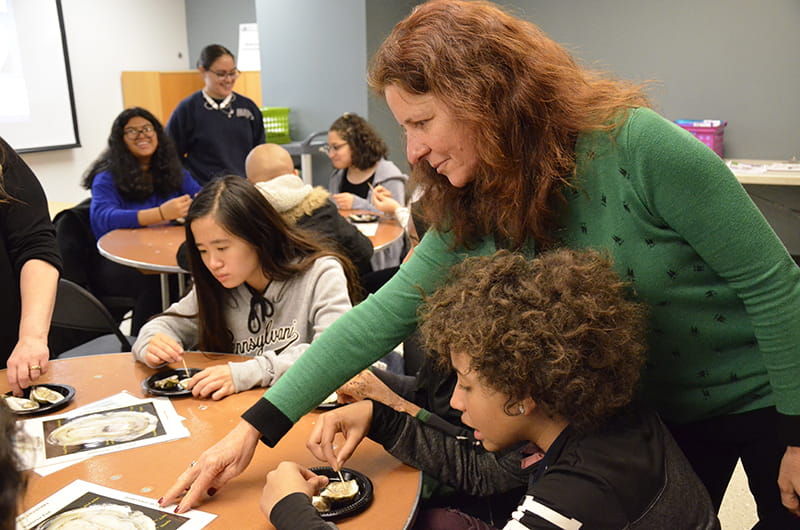WINS Program Celebrates 35 Years of Opportunity

- A Nanomaterial Flex — MXene Electrodes Help OLED Display Technology Shine, While Bending and Stretching
- Mosquitoes' Bloodsucking Tubes Could Enable High-Definition 3D Printing
- Drexel Environmental Collaboratory Releases Cross-Sector Findings on Severe Weather Recovery Challenges
- Student Sketches Bring Drexel’s Historic Objects to Life

Betsy Payne, manager of the WINS program, teaches students how to dissect oysters during a WINS I class.
There’s still a few minutes before class time, but several participants in the Women in Natural Sciences (WINS) program at the Academy of Natural Sciences of Drexel University are already in the WINS office located in the basement of the museum, helping staff with office work. Adjacent to a corkboard wall plastered with dozens of the high school graduation photos of the program’s alumna, current students are helping to sort through applications for the next WINS I class comprised of high school freshmen. More than 100 current 8th grade applicants will be whittled down into 25 participants who will start the program this summer.
To some regard, an accepted application to the WINS program is like a golden ticket to becoming one of those graduation photos tacked to the wall. The graduation rate amongst WINS participants is much higher than that for the School District of Philadelphia overall, and 97 percent of those who graduate continue on to higher education. This is because WINS takes young women from public and charter high schools in Philadelphia and introduces them to careers in science, technology, engineering and math through hands-on workshops, college exploration and positive youth development.
The requirements to be accepted and to stay in WINS — motivation, participation, maintaining a good attitude and a B average — may cause some students to drop along the way. But for those who cherish the WINS golden ticket, the program has been opening a whole new world for disadvantaged high school girls in the area for the past 35 years and continues to do so today.
Betsy Payne, who has managed the WINS program for more than 10 years, said the program doesn’t seek out students with all A’s who swear up and down they’ll be future scientists. The main focus of the program is to give opportunities to girls who wouldn’t have the chance for such experiences otherwise.
“We don’t necessarily take the girl who is already gung-ho about science because, again, we’re trying to get those girls who maybe don’t really know what’s out there and give them some opportunities,” she said in between checking on the WINS I class which has just commenced.
The high school freshmen students will be dissecting oysters and will then have a chance to eat them — a first for many.
“Our main audience are low-income, single-parent households,” Payne said. “We are looking for those girls who don’t have the opportunities otherwise.”
Those opportunities include, for the WINS I freshmen class, weekly classes at the Academy and then a field trip one Saturday a month. For WINS II participants, who have completed the WINS I program and continued on through sophomore, junior or senior year of high school, this also means opportunities to obtain internships, attend and present at conferences and join the group’s annual college visits. All of these opportunities are of no cost to the WINS participants or their families, right down to the SEPTA passes needed to travel to the Academy.
Those opportunities include, for the WINS I freshmen class, weekly classes at the Academy and then a field trip one Saturday a month. For WINS II participants, who have completed the WINS I program and continued on through sophomore, junior or senior year of high school, this also means opportunities to obtain internships, attend and present at conferences and join the group’s annual college visits. All of these opportunities are of no cost to the WINS participants or their families, right down to the SEPTA passes needed to travel to the Academy.
“You learn about very specific things, the things and careers that you didn’t even think existed, like the study of water, ento…,” Chapman stated.
“Entomology,” Betsy said, finishing Chapman’s sentence with a laugh.
For Lynn Larabi, a sophomore at Central High School in the WINS II program, WINS helped her discover that, though she’s undecided in her future career path, she wants to fight for environmental equality and help people better their communities. She also enjoys how her WINS interactive learning experiences have given her the opportunity to apply what she learns in the classroom to the outside world.
“Seeing a program that advocates for women to go into these male-dominated STEM fields was a big opportunity,” Larabi said. “As a first-generation [future college] student as well, I’m seeing a program that introduces me to all of these opportunities and be surrounded with people who love the same things that I do. It’s very encouraging.”
Payne said she hopes to continue to grow the WINS program’s connection to Drexel through internships and an increased focus in the technical, engineering and computer fields, which are often intertwined with science.
Drexel already offers a full scholarship to one WINS graduate each year who is accepted to the University. In 2014, that was Jackie Ng, environmental science ’19, who is currently doing her co-op with WINS to tie her major to her minor in STEM education.
Drexel already offers a full scholarship to one WINS graduate each year who is accepted to the University. In 2014, that was Jackie Ng, environmental science ’19, who is currently doing her co-op with WINS to tie her major to her minor in STEM education.
“It’s really a sisterhood that forms,” she said. “All the girls, through these classes and overnight trips, they get to strengthen that bond.”
The bond with WINS sometimes does not even break after graduation. Alumnae will often come back to help teach classes or speak on the “Life After WINS” annual alumna panel, Payne said. This helps current participants see what the alumna are doing in a variety of fields.
Payne hopes to see many alumna and other supporters at the program’s 35th anniversary fundraiser on May 9 at the Academy. As most of the WINS program is run on grant money, Payne said additional funding is extremely important to the continued success of the program. Grants and fundraising help with both day-to-day activities as well as special events, such as a previous trip she took to Japan with two WINS participants for the Science Centre World Summit, a global meeting of professionals from science centers and museums.
Payne hopes to see many alumna and other supporters at the program’s 35th anniversary fundraiser on May 9 at the Academy. As most of the WINS program is run on grant money, Payne said additional funding is extremely important to the continued success of the program. Grants and fundraising help with both day-to-day activities as well as special events, such as a previous trip she took to Japan with two WINS participants for the Science Centre World Summit, a global meeting of professionals from science centers and museums.
“They come out scientists,” Payne said. “They can be the lawyer, but they will have a background in science where they’re going to look at things in a different way. They’re going to see the world more as something that’s interconnected.’”
Find out more about the WINS program at ansp.org/education/programs/wins/. To learn more about the 35th anniversary celebration and fundraising event, visit ansp.org/get-involved/support/wins-35/.
In This Article
Drexel News is produced by
University Marketing and Communications.
